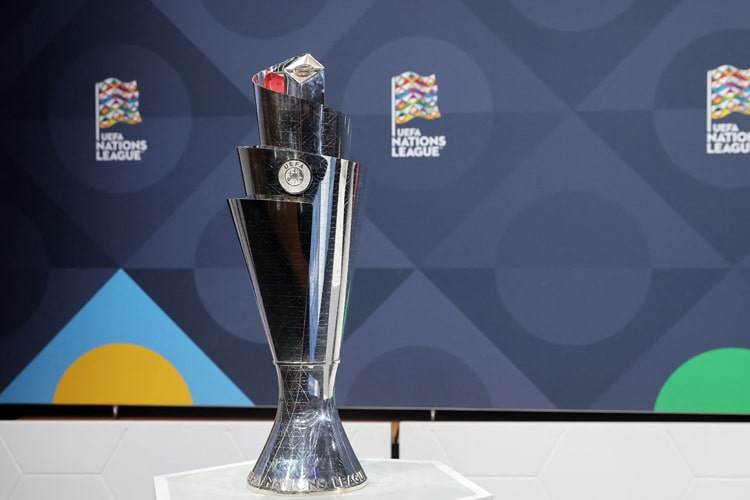Nations League: teams may include 26 players on matchday squads

UEFA confirms that Nations League finalists, including Portugal, can register 26 players for matchday squads in 2025. The expanded rule supports player rotation amid a packed schedule. Portugal face Germany in the semi-final on June 4.
UEFA has officially confirmed that national teams competing in the final phase of the 2025 UEFA Nations League will be allowed to include up to 26 players on their matchday squad sheets, up from the traditional 23.
This adjustment comes as part of efforts to accommodate the congested football calendar and the physical demands placed on players toward the end of a long season.
The decision was ratified during a meeting of UEFA’s Executive Committee, held on Wednesday in Bilbao, Spain. The move is seen as a proactive step by UEFA to provide teams with more flexibility in managing player workloads and injuries during the tournament, which will be played just weeks before several national teams head into further international duties, including World Cup qualifiers and youth competitions.
The timing of the announcement is particularly relevant for Portugal, as national team manager Roberto Martínez had just the day before revealed a 27-man preliminary squad for the tournament. The UEFA decision effectively aligns with Martínez’s strategy, allowing him greater tactical and squad rotation options ahead of one of the most important competitions of the year.
In the official statement, UEFA clarified the rationale behind the change: “The Executive Committee approved the increase in the number of players who can be registered by teams participating in the 2025 Nations League Finals from 23 to a maximum of 26, taking into account the end-of-season dynamics and the increase in activity during the summer of 2025.”
The 2025 UEFA Nations League Finals will bring together four of the continent’s top national teams in what is shaping up to be a fiercely contested mini-tournament. Portugal will face host nation Germany in the first semi-final on June 4 in Munich, while Spain take on France on June 5 in Stuttgart. The winners will meet in the final on June 8 at the Allianz Arena, home of Bayern Munich, while the losers will battle it out for third place on the same day in Stuttgart.
Portugal’s path to the semi-finals was marked by drama and resilience. After topping Group 1 in the initial phase finishing ahead of Croatia, Scotland, and Poland the Seleção faced Denmark in a thrilling quarter-final showdown. In the first leg, played in Copenhagen, Portugal fell 1-0, leaving them with work to do in the return fixture. In front of a raucous home crowd at Estádio da Luz in Lisbon, they mounted a stunning comeback, winning 3-2 in regular time to level the aggregate score and then pulling away in extra time for a 5-2 total victory.
The attacking flair displayed in Lisbon was reminiscent of Portugal’s finest moments in international football and signaled a resurgence under Roberto Martínez, who has been tasked with guiding the team into a new era following the departure of longtime manager Fernando Santos. The squad features a blend of experience and youth, including established stars such as Bernardo Silva, Bruno Fernandes, and Rúben Dias, as well as emerging talents like António Silva, João Neves, and Francisco Conceição.
Portugal were the inaugural winners of the Nations League, lifting the trophy on home soil in 2019 after defeating the Netherlands in the final. That victory remains one of the high points of Portuguese football in the modern era, especially as it came just three years after the country’s historic Euro 2016 triumph. However, subsequent editions of the Nations League saw Portugal fall short, as they failed to reach the final four in both the 2020/21 and 2022/23 campaigns.
This year, the ambition is clear: to reclaim the trophy and reassert Portugal’s position among Europe’s elite. The expanded squad rule could play a crucial role in achieving that goal, offering Martínez the flexibility to adapt to injuries, fatigue, and tactical shifts across what could be two extremely intense knockout games. It also opens the door for a broader pool of players to gain international experience in a major competition setting something that could benefit the national team as it prepares for the 2026 FIFA World Cup.
Germany, as hosts, will enjoy the backing of their home supporters, and their semi-final clash with Portugal promises to be a blockbuster. Spain and France, on the other side of the bracket, bring rich footballing traditions and squads loaded with world-class talent. The stage is set for a thrilling climax to the fourth edition of the Nations League, and with the squad size now extended to 26, national team managers may have just gained a vital edge in the race for silverware.